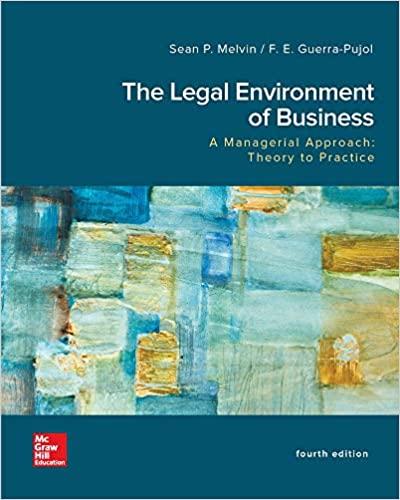Question
A woman named Martha lives with paranoid schizophrenia. She takes medication for her illness and has been deemed to be stable by all of her
A woman named Martha lives with paranoid schizophrenia. She takes medication for her illness and has been deemed to be "stable" by all of her mental health professionals. One day, on Thanksgiving night (November) in the suburbs of Chicago, at about 8:00 p.m., she is the passenger in a car and her boyfriend Noah is the driver. About a block from their destination of home, Noah starts to get ill and the car begins to swerve. Martha is able to convince Noah to pull to the side of the road, and she will drive the rest of the way home. Noah agrees, and they switch places. Martha's driver's license is suspended, however, she feels that being so close to home, she can get Noah and herself home safely.
As Martha begins to pull off, she nearly sideswipes and almost hits a car that is driving past her that she doesn't see. The car she almost hits is a police car. The officer immediately pulls over, cites Martha for almost causing an accident, and then, after giving Miranda rights, arrests her for driving on a suspended license. Martha, panicking and starting to have a meltdown, pulls away from the officer as a soft voice in her head tells her that the officer is trying to kidnap her. As a result, Martha punches him in the nose as the officer is trying to handcuff and arrest her. The officer uses a low voltage on his taser to try and subdue Martha and the officer then charges Martha with battery. The officer does not know that Martha lives with paranoid schizophrenia.
A few months later, Martha is in court, pleads not guilty, argues that her medical diagnosis is a defense, and says the officer used excessive force.
The Illinois law on the definition of battery is as follows:
(720 ILCS 5/12-3)(from Ch. 38, par. 12-3) Sec. 12-3.Battery. (a) A person commits battery if he or she knowingly without legal justification by any means causes bodily harm to an individual (b) Sentence. Battery is a Class A misdemeanor.
Exam Questions 1:
(a) From the officer's perspective, how was his response appropriate?
(b) From the prosecutor's perspective, what evidence can the prosecutor use to prove Martha's guilt in this case? (Make sure you take into consideration what "mens rea" means. How is mens rea present in this case?) What evidence could the prosecutor use to argue why the force the officer used against Martha is NOT excessive?
(c) From Martha's perspective, what evidence could her attorney use to win her case, asserting that Martha is not guilty ? (Make sure you take into consideration what "mens rea" means and does not mean. How is mens rea NOT present in this case? ) What evidence could her attorney use to argue why the force the officer used against Martha was excessive?
(d) From the judge's perspective, how should the judge rule as it relates to Martha's case and (ii.) whether or not the officer used excessive force? Why should the judge rule in this way?
Step by Step Solution
There are 3 Steps involved in it
Step: 1

Get Instant Access to Expert-Tailored Solutions
See step-by-step solutions with expert insights and AI powered tools for academic success
Step: 2

Step: 3

Ace Your Homework with AI
Get the answers you need in no time with our AI-driven, step-by-step assistance
Get Started


